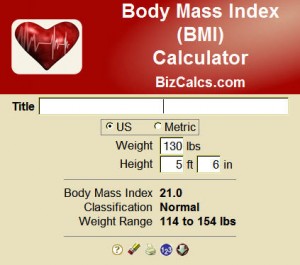BMI Body Mass Index is a number calculated from your weight and height. What does it mean? A BMI number is just a guide often used to determine a healthy body weight, or the level of health risks from being overweight.
Body Mass Index does not measure actual percentage of body fat or lean body mass. BMI calculation is NOT accurate for the elderly populations, pregnant women or very muscular athletes such as weightlifters.
BMI numbers:
- BMI is less than 18.5 – “underweight” range
- BMI is 18.5 to 24.9 – “normal” or Healthy Weight range
- BMI is 25.0 to 29.9 – “overweight” range
- BMI is 30.0 or higher – “obese” range
One women’s research study observed women under the age of 65 and are within the ideal BMI range. This study showed that moderate exercise such as climbing stairs, taking a hike, taking a yoga class can help you maintain your healthy BMI. A weekly 150-minute of moderate physical activity is enough to keep from weight gain and lowers health risks. However, if you are at the higher BMI range, you need more rigorous exercises and a calorie reduction plan as well. See Calorie Calculator.
Although BMI is not an accurate health risk indicator for all populations, many doctors, hospitals and insurance companies use it as a tool to identify weight problems such as underweight, overweight or obese. The associated health risk factors are their main concerns.
So, why not aim to be within that “healthy range” of 18.5-24.9.
By maintaining an ideal BMI range, you can reduce your health risks for chronic diseases, feel healthier, and may even lower your health care costs.
Calculate your BMI
Related posts:
Calories Need A Day
How To Keep a Food Record
Body Fat Calculator
Heart Attack Risk Assessment



{ 1 comment… read it below or add one }
I learned how to calculate my BMI. I wasn’t happy with the results but I learned something new. I was amazed that insurance companies and hospital could rate you based on the BMI.
{ 5 trackbacks }